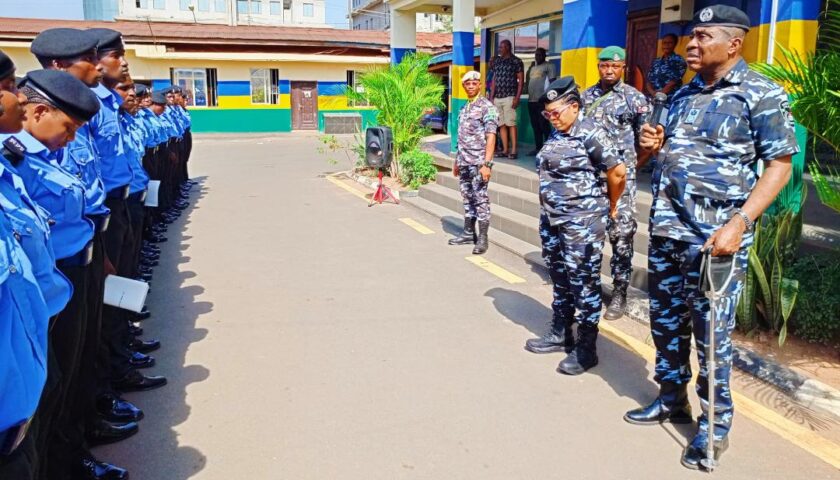There is a surge in the hawking of naira notes at exorbitant charges in different parts of the country, as Nigerians continue to struggle with limited access to cash in banking halls despite threats by the Central Bank of Nigeria. The CBN had warned that it would penalise Deposit Money Banks found supporting the hawking of naira notes.
In a circular dated November 13, 2024, signed by the acting Director of Currency Operations, Muhammad Olayemi, and released to the public on Friday, November 15, the CBN warned DMBs against cash hoarding and diversion, emphasising that such actions would attract stiff penalties.
However, our correspondents who monitored the situation in some major cities between Thursday and Friday, reported that while many Nigerians still struggled to access cash in banking halls, hawkers had cash in abundance, selling at exorbitant rates despite the CBN’s month-long threats.
Cash Hawking Spree
A mint note seller in the Agege area of Lagos, who identified herself as Adebimpe, revealed that she charges N7,000 for N20,000 new notes.
“It is difficult to get cash these days because the bankers have increased their charges. Sometimes, they take as high as N3,000 on N10,000 new notes. We have to add our gains too. It’s business,” she said.
When this correspondent approached a banker in the state, pretending to need new mint naira notes, the bank worker disclosed that she often sold N200,000 mint notes for N230,000, making a gain of N30,000.
When asked why some bankers sold naira notes, the worker said, “It is not that you can’t get this cash for free. But the process of getting it inside the bank is not easy. That is why even we, bank workers, have to settle some people to bring the cash notes out for us.”
Another bank worker in Abeokuta, the Ogun State capital, who spoke on condition of anonymity, stated that “cash dealers” who resold at parties and social gatherings bought N20,000 for N25,000 and N100,000 for N120,000.
He disclosed that freshly minted naira notes were not usually available to bank customers over the counter, “but we have special arrangements for cash dealers who specialise in reselling at parties and social gatherings.”
A cash dealer, who identified herself as Rafiu, told one of our correspondents that there was a high demand for fresh naira notes at weddings and burials. “The business is lucrative. For instance, we make N8,000 on N20,000, while N100,000 attracts a gain of N25,000 to N30,000. We have arrangements with bank officials who sell naira notes to us at agreed rates,” Rafiu said.
Bank Officials And Private Deals
In Osogbo, the Osun State capital, Saturday Punch found that cash trading also thrived, with some hawkers revealing that they bought and sold the mint meant for bank customers. Investigations revealed that some bank officials prioritised selling mint to high-end clients at agreed prices.
The officials, often from new-generation banks, collaborated with cash dealers to profit from the notes. A mint seller said, “We always meet outside the bank premises whenever they want to give me the money. Bank officials sell N20,000 worth of mint in N200 denominations to me at N5,000, while I pay between N8,000 and N10,000 for N50,000 worth of mint.”
She added that she resold N20,000 mint at N28,000 and N50,000 mint at N65,000 to customers. At clubs, she charges N30,000 for N20,000 mint and N70,000 for N50,000 mint. In Ibadan, Oyo State, a similar trend was observed on Iwo Road, where traders sold cash at increased rates.
Akeem, a trader, disclosed that N10,000 in minted notes now costs N2,000, while N50,000 is sold for N5,000. Another trader, Ibrahim Bako, attributed the rising rates to the prevailing economic situation. “Everything has increased. We used to sell N5,000 for N1,000, but now it is N2,000. The difference is small, but it has gone up because of the situation in the country,” he said.
Shops Hawk In Imo
Given the scarcity of money in Imo State, especially for point-of-sale operators, big shops, supermarkets and filling stations have resorted to making extra gain by hawking their cash. A PoS operator, who gave his name as Emeka, said, “We buy the money from big shops, supermarkets and even filling stations depending on your contacts.”
The owner of a big shop in Ekeonunwa market, who spoke on condition of anonymity, said, “We want to ensure the scarcity of money is addressed.
“Instead of going to the bank to deposit the money and the same bank will collect interest rates and give you less than N20,000 across the counter, it’s better we hawk it to the PoS operators and make extra gain. We don’t sell anything less than N100,000.”
When contacted on Thursday and Friday regarding actions taken by the apex bank weeks after issuing the threat, and how many banks had been sanctioned for disobeying its order, the CBN acting Director of Corporate Communications, Mrs Hakama Ali, did not respond to calls or messages.
Bank Directors React
Speaking to Saturday Punch, the Chairman of the Bank Directors Association of Nigeria and Fidelity Bank Plc, Mr Mustafa Chike-Obi, condemned the practice of cash hawking and called for the arrest and prosecution of any bank worker found culpable.
He said, “In every business, you will find individuals who try to break the rules. However, banks have no interest in selling mint notes. Anyone engaging in such practices is acting outside the guidelines of the bank.
“If you know of any such persons, please, expose them because these actions occur without the knowledge or approval of the banking system. We are 100 per cent against it. It does not benefit us in any way. Any staff involved in this should be apprehended and punished.
“As the chairman of Fidelity Bank, if any of our staff engage in such activities, we will report them to the police. They will be arrested and dismissed. The banking system does not condone such behaviour. Therefore, people should not label this as a systemic issue. It is a highly unusual occurrence. While one or two individuals may be involved, as a banking system, we are 100 per cent against it.”
He attributed the troubling trend to the insufficient cash supply in banks, saying, “We will file the appropriate reports with the CBN to request more cash because it does not help us when our customers come looking for cash and we do not have it.
“Like I have said, the root cause of this problem is the insufficient supply of cash, and this is being addressed by both the banks and the CBN. However, let me add this: the CBN’s current monetary policy aims to reduce inflation and stabilize the exchange rate.
“To achieve this, they must mop up excess liquidity in the system. So, some of what you are observing may be a consequence of the CBN’s efforts to reduce liquidity in the economy.”
In his reaction, a human rights lawyer, Festus Ogun, called on the security agencies, especially the police and men of the Economic and Financial Crimes Commission to join the CBN in waging war against the cash hawkers.
The Force Public Relations Officer, ACP Olumuyiwa Adejobi, did not respond to calls and messages made to his telephone lines by one of our correspondents on Friday morning and has not returned the call as of the time of filing this report. Source: Punch





